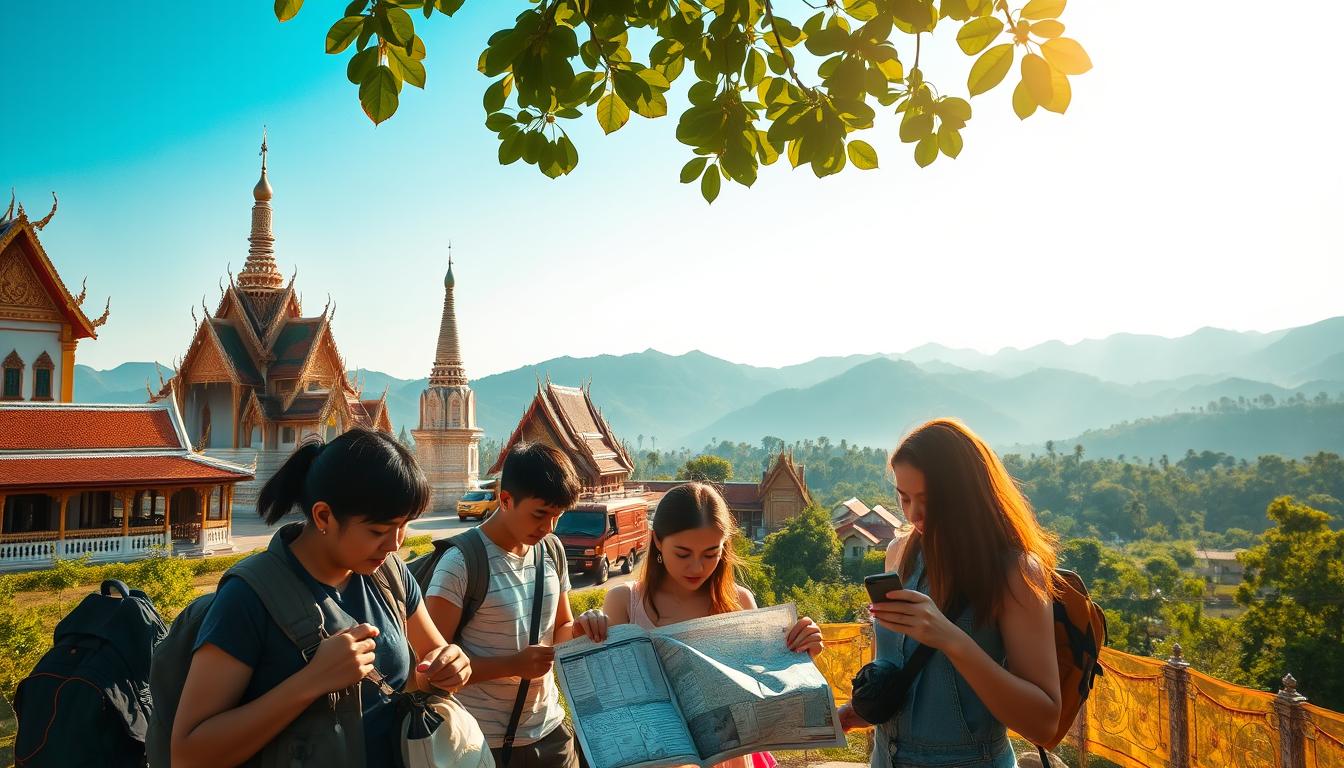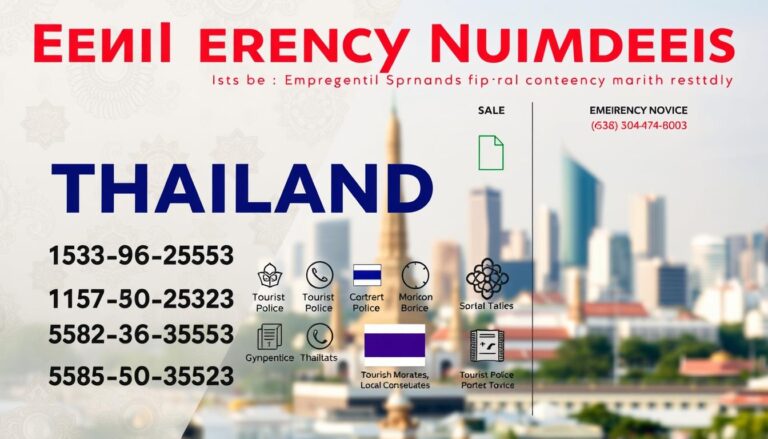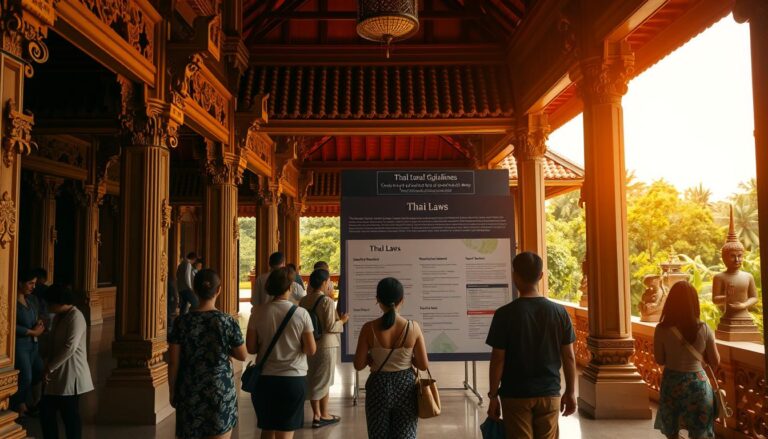Thailand Travel Warnings & Safety Guide: Essential Thailand Safety Tips
Planning a trip to Thailand? It’s key to know the risks and take steps to stay safe. This way, you can enjoy your journey without worry.
By staying informed and following essential safety tips, you can reduce risks. This guide uses government travel advisories. It gives you a full view of what to expect and how to stay safe in Thailand.
Key Takeaways
- Understand the importance of staying informed about local conditions in Thailand.
- Learn how to minimise risks while travelling in Thailand.
- Discover essential safety tips for a enjoyable trip.
- Find out how to stay up-to-date with the latest travel advisories.
- Explore ways to ensure your safety while exploring Thailand.
Current Travel Advisories for Thailand
The UK Government regularly updates travel advisories for Thailand. They highlight areas to watch out for and safety tips. It’s vital to keep up with the latest news when planning your trip.
UK Government Travel Advice
The UK Government’s travel advice for Thailand is detailed. It talks about safety and security. They warn about certain regions, like the southern provinces near Malaysia, that need extra care.
Key areas of concern include:
- The southern provinces of Yala, Pattani, and Narathiwat, where there’s an increased risk due to insurgency-related violence.
- Border areas with Myanmar and Cambodia, where there’s a risk of banditry and clashes.
Recent Safety Updates
Recent updates from the UK Government stress the need for vigilance in major cities like Bangkok. Petty crime and scams are common. So, be careful when using public transport or talking to strangers.
To stay safe:
- Be mindful of your belongings, specially in crowded places.
- Avoid carrying large amounts of cash; use reputable money exchange services.
Regional Concerns Within Thailand
Thailand is a diverse country with different safety concerns. While places like Phuket and Chiang Mai are generally safe, some areas need more caution.
Regional safety considerations:
- Avoid travelling to the southernmost provinces near the Malaysian border due to the high risk of insurgency-related violence.
- In Bangkok, be cautious of scams and petty theft, specially in tourist areas.
Understanding Thailand’s Safety Landscape
Planning a trip to Thailand? It’s key to know about the country’s safety. Thailand is famous for its culture and beaches but also has safety issues. Knowing these can help you have a great trip.
Crime Statistics for Tourists
Petty theft and scams are common in tourist spots. Be careful with your things, like in markets and busy places. Here are some tips:
- Pickpocketing and bag snatching are common in tourist areas.
- Scams, including those related to gem buying and tuk-tuk rides, are common.
- Always keep your valuables secure and be wary of overly friendly strangers.
Political Stability Overview
Thailand’s politics can be unstable, with protests and demonstrations. These are not usually aimed at tourists but can affect your plans. Keep up with the latest news:
- Follow local news and government advisories.
- Avoid areas of protests and demonstrations.
- Register with your government’s travel advisory service to receive important safety updates.
Comparison with Other Southeast Asian Destinations
Thailand sees a lot of tourists, which can lead to more crimes. But, with the right precautions, you can stay safe:
- Be more cautious in Thailand compared to less touristy destinations like Laos or Cambodia.
- Follow local advice and stay informed.
- Use reputable services and avoid engaging with overly aggressive vendors.
Understanding Thailand’s safety can help you prepare for a safe trip. Always be alert and take steps to protect yourself.
Thailand Travel Warnings Safety Guide Thailand Safety Tips
Before you start your Thai adventure, getting ready is key. You need to prepare well to have a safe and fun trip. There are important things to think about before you go.
Pre-Departure Preparation
Getting ready is the first step to a great trip. Researching your destinations in Thailand and knowing the local conditions can make your trip better. Also, registering with your country’s travel advisory service is a good idea. This way, you’ll get important safety updates about Thailand.
“The moment you leave your home country’s borders, you’re in a different environment, and being prepared is your best defense against the unexpected.” – Travel Safety Expert
Documentation and Insurance Requirements
Having the right documents is essential. Make sure your passport is valid for at least six months after you plan to leave Thailand. Also, check if you need a visa and apply early if you do.
Travel insurance is also very important. It should cover medical costs, trip cancellations, and lost or damaged luggage. “A good travel insurance policy is your safety net against unexpected things,” says a travel insurance expert.
- Check your passport’s validity.
- Apply for a visa if required.
- Purchase good travel insurance.
Packing Safety Essentials
Packing the right things can really help your safety and comfort. You’ll need a first-aid kit, a money belt, and copies of important documents. Think about packing a portable water filter or purification tablets to have safe drinking water.
- First-aid kit.
- Money belt.
- Document copies.
- Portable water filter or purification tablets.
By focusing on these pre-departure steps, you’ll be ready for the challenges of traveling in Thailand. This will make your trip safer and more enjoyable.
Health and Medical Safety in Thailand
When planning your trip to Thailand, think about health and medical safety. This ensures a great trip. Thailand has its own health issues you should know about to stay safe.
Recommended Vaccinations
See your doctor or a travel clinic before going to Thailand. They’ll tell you about needed vaccinations. The Thai government and the World Health Organization (WHO) give advice on health precautions.
- Hepatitis A: Recommended for all travelers to Thailand
- Hepatitis B: Recommended for travelers who may be exposed to blood or bodily fluids
- Typhoid: Recommended for most travelers, specially those staying with friends or relatives or visiting smaller cities or rural areas
Water and Food Safety
Stay safe from waterborne illnesses by being careful with what you eat and drink. Here’s how:
- Drink bottled or filtered water
- Avoid eating undercooked or raw meat, seafood, or eggs
- Choose busy restaurants with high turnover to ensure food is freshly prepared
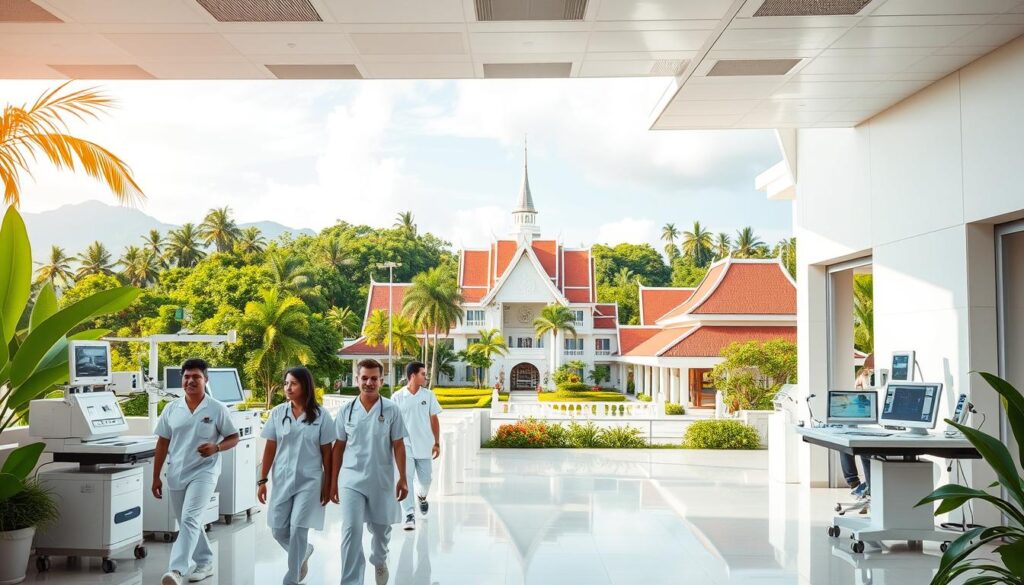
Accessing Medical Care
Thailand’s healthcare is good, but be ready:
- Research local hospitals and clinics near your accommodations
- Keep a list of emergency contact numbers, including your embassy
- Consider purchasing travel insurance that covers medical evacuations
Health Insurance Considerations
Good health insurance is key for Thailand travel. Make sure your policy covers:
- Medical expenses, including hospital stays and treatments
- Emergency evacuations to your home country or a nearby medical facility
- Repatriation of remains in the event of death
By knowing and taking steps, you can avoid health risks and have a great time in Thailand.
Regional Safety Guide: Where to Be Extra Cautious
Knowing the safety situation in different parts of Thailand is vital for safe travel. Each area has its own safety issues. Being informed helps ensure a safe and fun trip.
Southern Border Provinces
The southern border provinces of Thailand face high risks due to insurgent activities. It’s important to be very careful when visiting these areas.
- Avoid travelling to the provinces of Narathiwat, Pattani, and Yala unless absolutely necessary.
- Be aware of your surroundings and avoid displaying signs of wealth.
- Follow local advice and instructions from authorities.
Bangkok Safety Concerns
Bangkok, a busy city, has its own safety worries. Petty theft and scams are common in tourist spots.
- Be cautious of your belongings, specially in crowded places like the Skytrain and buses.
- Avoid carrying large amounts of cash and use reputable taxi services.
- Be aware of common scams targeting tourists.
Island and Beach Destination Risks
Thailand’s beaches and islands are loved by tourists but have their own dangers. These include strong currents and too many people.
“Always swim in designated areas and follow local advice regarding sea conditions.”
Also, watch your things on beaches and don’t leave valuables alone.
Northern Thailand Considerations
Northern Thailand is mostly safe, but there are risks like road accidents and theft.
- Be cautious when travelling by road, specially on mountainous routes.
- Avoid displaying signs of wealth and keep valuables secure.
- Respect local customs and traditions.
By knowing these safety tips, you can have a safe and enjoyable trip to Thailand.
Transportation Safety Measures in Thailand
To stay safe in Thailand, knowing the transportation safety tips is key. The country has a wide range of travel options, from busy streets in Bangkok to peaceful countryside roads. It’s important to know how to travel safely.
Road Safety and Traffic Concerns
Road safety is a big issue in Thailand, with many accidents involving motorcycles and pedestrians. Always wear a helmet when riding a motorcycle. Be careful of drivers who don’t follow the rules. Using safe taxi services or ride-hailing apps is also a good idea.
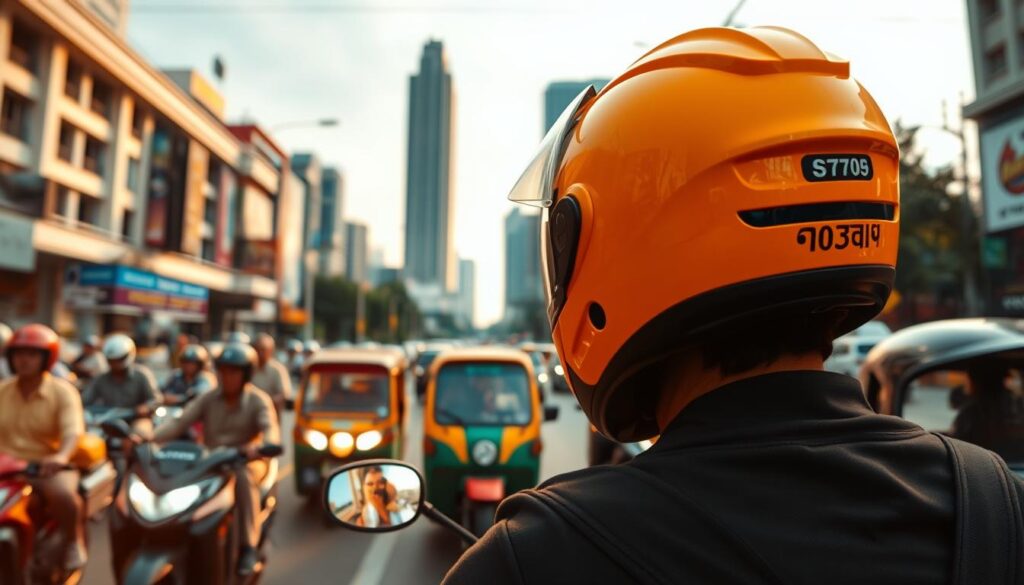
Public Transport Guidelines
Thailand’s public transport includes buses, trains, and ferries. When using public transport, keep an eye on your belongings, as pickpocketing can happen in crowded places. For longer trips, choose buses from trusted companies that focus on safety.
- Use licensed taxis or ride-hailing services.
- Be aware of your surroundings, even in busy stations.
- Keep your valuables safe.
Boat and Ferry Safety
Traveling by boat or ferry needs careful planning. Make sure the boat is run by a reliable company and follows safety rules. Always wear a life jacket. Be careful of too many people on the boat, as it can be dangerous.
Motorcycle and Scooter Rental Advice
Renting a motorcycle or scooter is a great way to see Thailand. But, you must be careful. Always wear a helmet and follow the traffic rules. The roads can be different, and driving at night is risky.
By knowing the safety tips, you can make your travel in Thailand safer. Keeping yourself safe will make your trip more enjoyable and worry-free.
Common Scams and How to Avoid Them
Knowing about scams in Thailand can make your trip better. Tourists often face scams, like tuk-tuk drivers charging too much or gem scams. Knowing these scams helps you explore Thailand’s streets safely.
Tourist-Targeted Scams in Bangkok
Bangkok’s busy streets and markets attract scams. Tuk-tuk drivers or locals might offer tours at high prices. Always look up trusted tour operators and agree on prices first.
Be careful of being taken to gem shops or tailors for expensive buys. Watch out for friendly locals pushing you to certain shops or places.
Beach and Island Scams
Thailand’s beaches and islands have scams too. Vendors might charge too much for goods or services. Always compare prices and be ready to negotiate.
Scams include fake or pricey tickets for island tours or water activities. Buy tickets from official vendors or tour operators.
Transportation Scams
Transport scams are common, like at airports and tourist spots. Taxi drivers might not use the meter or say it’s broken. Always ask for the meter or agree on the fare before you go.
Another scam is taking a “scenic route” to charge more. Use trusted taxi services or apps to avoid this.
Shopping and Gem Scams
Gem scams are big in Thailand, where tourists are sold stones at low prices. Be careful of deals that seem too good. Always check the market value of gems you want.
When shopping, watch out for fake or overpriced items. Compare prices and haggle at markets.
By being informed and careful, you can enjoy Thailand’s culture and hospitality without scams.
Natural Disaster Risks and Precautions
When planning your trip to Thailand, knowing about natural disaster risks is key. Thailand faces dangers like monsoons, flooding, and tsunamis, mainly in coastal areas.
Monsoon Season Safety
The monsoon in Thailand lasts from May to October. It brings heavy rain and flooding. To stay safe:
- Check the weather forecast often.
- Don’t travel when it’s raining heavily or flooding is expected.
- Have food, water, and medicines ready.
The Thai Meteorological Department says the southwestern monsoon causes a lot of rain on the western coast. Being ready for weather changes is important for your safety.
Flooding Preparedness
Flooding is common during the monsoon. To prepare:
- Keep up with weather news and flood alerts.
- Know where to go and where to find shelters.
- Store your important things and documents safely.
Flooding can happen quickly. Having a plan is essential. Make sure you can contact your embassy or consulate easily.
Tsunami Awareness in Coastal Areas
Coastal areas in Thailand are at risk of tsunamis. If you’re in a coastal area:
- Learn about tsunami warning signs and how to evacuate.
- Stay near high ground or safe zones.
- Join tsunami drills if they happen.
“Tsunamis can occur with little warning, so it’s vital to be prepared and know what to do in case of an emergency.”
By understanding these risks and taking precautions, you can have a safer trip to Thailand. Always stay informed, be ready, and follow local advice to avoid risks.
Cultural Sensitivities and Legal Considerations
It’s important to know and respect Thai culture and laws for a smooth trip. Thailand is rich in culture and has strict rules that affect daily life.
Respecting Thai Customs and Laws
Thai culture values respect and modesty a lot. When visiting temples or cultural events, dress modestly and remove your shoes when asked. Showing disrespect can cause problems.
Thailand has strict laws about lèse-majesté, which means insulting the royal family. This includes the king, queen, and their symbols.
Drug Laws and Penalties
Thailand has very harsh drug laws. Using, possessing, or trafficking drugs can lead to long prison sentences or even death. It’s vital to stay away from drugs while you’re there.
- Be aware of your surroundings and keep your belongings secure.
- Avoid engaging with strangers who offer drugs.
- Understand that drug laws are strictly enforced.
Royal Family Respect Guidelines
The Thai royal family is highly respected. Disrespecting them is taken very seriously. This includes:
- Being respectful when discussing the royal family.
- Avoiding any actions that could be seen as defacing or disrespecting images of the royal family.
- Understanding that lèse-majesté laws are actively enforced.
By being aware of these cultural and legal aspects, you can have a safe and fun trip to Thailand. Being a respectful visitor makes your experience better and helps you connect with the local culture and people.
Emergency Procedures and Important Contacts
Knowing emergency procedures and having key contacts can greatly help during your Thailand trip. Being ready for unexpected situations is very important.
Emergency Phone Numbers
It’s critical to know the right phone numbers for emergencies. For general emergencies, call 191 or 1669 for medical help. Also, keep your country’s embassy contact handy.
British Embassy Services
The British Embassy in Thailand offers many services to British citizens. They help in emergencies. You can reach them in Bangkok, Chiang Mai, or Phuket for support.
They can help replace lost passports, give info on local hospitals, and assist in crises.

Travel Insurance Claims Process
To make a travel insurance claim, you need all your documents. This includes a police report for crime victims, medical reports, and expense receipts. Contact your insurance provider quickly to learn how to make a claim.
What to Do If You’re a Victim of Crime
If you’re a crime victim in Thailand, report it to the police right away. You’ll need a police report for insurance and embassy help. Keep all incident details and documents.
The British Embassy can guide you on what to do next. They can also help contact your family if needed.
Safety Considerations for Specific Traveller Groups
Planning a trip to Thailand? It’s key to know the safety issues for different traveller types. Whether solo, with family, or in a group, knowing the right safety tips can make your trip better.
Solo Travel Safety Strategies
Thailand is great for solo travellers, with its rich culture and lively nightlife. But, it’s important to stay safe.
- Always keep your hotel room door locked and use the hotel safe for your valuables.
- Be cautious when using ATMs, specially at night, and avoid showing big amounts of cash.
- Stay updated on local news and follow local advice.
Women-Specific Safety Advice
Women travellers need to know about cultural norms and take extra steps for safety.
- Dress modestly, specially when visiting temples or cultural events.
- Avoid solo travel at night and use trusted taxi services.
- Be aware of your surroundings and keep your things safe.
LGBTQ+ Travel Considerations
Thailand is welcoming to LGBTQ+ travellers, but it’s wise to know local attitudes and customs.
- Look up LGBTQ+ events and places in your travel areas.
- Be careful in some areas, as views can change a lot.
- Stay in touch with local LGBTQ+ groups for advice and support.
Family Travel Safety Tips
For families with kids, a few safety tips can make your trip fun for everyone.
- Watch children closely, specially in busy places or near water.
- Make sure all family members have the right vaccinations before you go.
- Choose safe transport and check the safety of any vehicle you use.
By following these safety tips, you can have a safer and more fun trip to Thailand, no matter your group size.
Conclusion: Enjoying Thailand Safely
By being informed and prepared, you can enjoy Thailand safely. This guide has given you key safety tips and travel warnings. It helps ensure your trip is smooth and fun.
When planning your trip to Thailand, keep an eye on travel advisories and safety updates. Knowing your surroundings and taking precautions can lower your risk.
This guide has prepared you for the challenges of traveling in Thailand. By following these tips, you can have a safe and enjoyable trip. Make the most of your time in this beautiful country.

